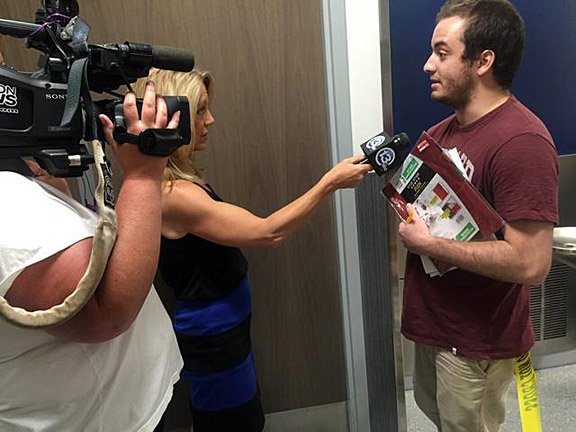A roped-off crime scene. A dead body on a couch. A pesky reporter trying to get the scoop.

13 ABC Action News Reporter Melissa Voetsch interviewed UT student Alex Izsak, a criminal justice major, as part of the crime scene investigation that took place May 26 on Health Science Campus. Voetsch was brought in to teach students that journalists come to crime scenes to conduct interviews and get information about investigations.
By the end of the six-week class, these same students were in a courtroom trying to prosecute the accused murderer of this simulated crime.
The class, offered through the UT College of Social Justice and Human Service, is a pilot course for the Criminal Justice and Paralegal Studies programs. The cross-listed class was titled Criminal Forensics and Trial Practice for paralegal studies students and Criminal Investigations III for criminal justice students.
“This has been the class that I have learned the most,” said Nick McCullough, a criminal justice major who served as a prosecutor during the mock trial. “You can only learn so much in a textbook about investigations and trial prep. Being hands-on is so much more valuable. This is as close to the real deal that you can get. I have learned more about criminal investigations in these six weeks than I have in the entire semester.”
The class was taught by John Schlageter, director of the Paralegal Studies Program, and Mick Dier, a retired UT police officer and lecturer in the Criminal Justice Program.
Students were placed on prosecution and defense teams and assigned as crime scene investigators, paralegals and attorneys. They were responsible for investigating the mock homicide, indicting one of three possible suspects, and conducting a jury trial.
“I think students gain transferable skills that they wouldn’t otherwise attain,” Schlageter said. “You can read books all you want, but until you do it, you aren’t truly getting it.”
With the guidance of Schlageter and Dier, criminal justice students shared their knowledge of forensic principles such as crime scene processing, blood spatter analysis and interviewing/interrogation. In return, paralegal studies students shared information relative to trial procedure, including courtroom technology, the preparation and examination of trial witnesses, and effectively delivering an opening statement and a closing argument.
Callie Nelson, a paralegal studies graduate, took the class when it first started and volunteered at the mock trial June 24. She is attending law school at Cleveland-Marshall College of Law.
“It is really important for us paralegal students to understand how the investigation works,” she said. “For criminal justice students, it is important to see what it is like after you are done investigating the crime.”